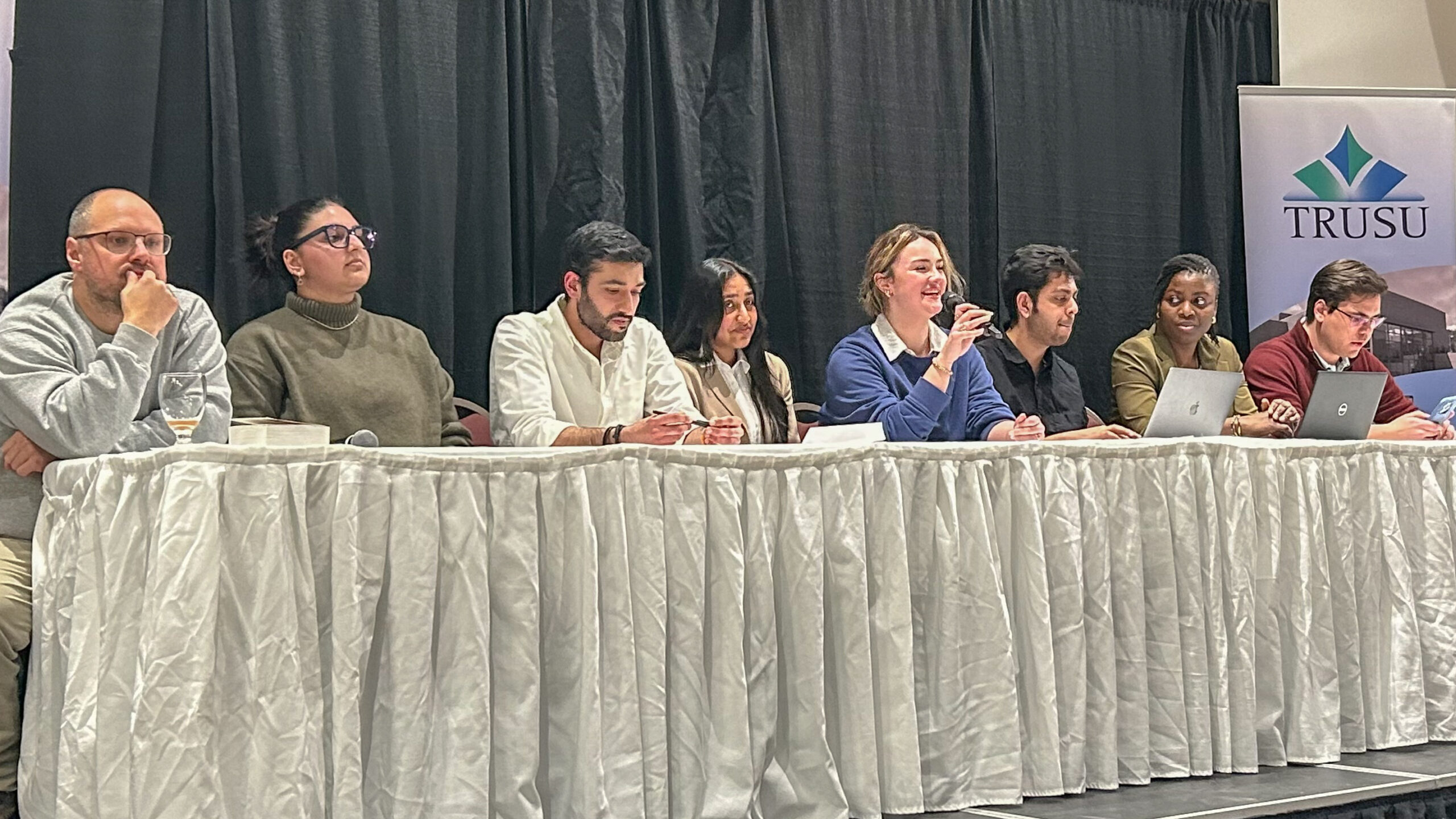Each year, TRUSU holds elections to select a new board of directors. According to their website, about 20 board positions are up for elections each year. Elections occur any time before March 31, and elected officials take office from May 1 until the end of the next academic year.
This year’s TRUSU annual general meeting (AGM), which kicked off at 6 p.m. on Jan. 28 at the TRU Mountain Room, oversaw a few noteworthy amendments to the students’ union electoral procedures. Most significantly, the meeting presented a motion to end the slate system, which allowed campaigning students to group themselves into political parties.
The AGM serves as an opportunity for the union, students, and faculty members to monitor TRUSU’s activities over the past year and gain perspective on the direction in which it will be heading in the future. The event boasts an open-door policy, meaning all interested members of the TRU community are welcome to sit in, listen, voice their concerns and make contributions. Complete with committee reports, audits and a budget presentation; the meeting offers transparency and clarity on major union operations.
New business was the last item on the AGM agenda once all reports had been presented. This year, all new business involved amendments to campaign and electoral procedures.
“At the end of last year’s annual election, we received feedback from several places that there were perhaps some required changes that could be made to improve our electoral policy,” said TRUSU’s Executive Director Nathan Lane. “I was tasked with making [recommendations] to the board of directors, which I did.”
The recommendations involved, amongst other things, three notable changes to the TRUSU election process: modernization of the by-laws, restructuring of the electoral timeline, and the elimination of the slate system.
The policies in the by-laws restricted campaigning to only on-campus, in-person campaigns, which Lane said became challenging to regulate given the amount of campaigning that now happens online. “When this policy was first created, there was little to no social media,” Lane said. “So [this amendment] removes the requirement that all campaigning must happen on campus.”
Further, adjustments made to the timeline of the elections reduce the process by one week. To achieve this, the proposal cuts down the two-week nomination period to seven days.
“Around 99% of all nominations come in the last day and in the last four hours,” Lane said. “I had to look back over ten years to find someone who even submitted a nomination on the first day of that two-week period. So that takes one week out of the election process for folks, with [virtually] no impact.”
Of all the amendments proposed, the most substantial was the change to the rules surrounding the formation of political slates or parties. Section II(f) of the election policy now reads: “No candidate shall collude with another candidate, including the formation of a party or slate prior to, during or following the campaign period.”
For Lane, this recommendation was made in response to behavioural criticisms levied at candidates over the past few years. Complaints of harassment, bullying and inappropriate conduct abounded, along with objections to the high barrier of entry these slate systems created for individual campaigners.
“I believe a lot of the negative behaviour happening is a sort of group mentality, and that leads to some pretty bad behaviour both online and in person,” Lane said. “But one of the things we’ve noticed is that people, individually, are actually pretty good to each other.”
“What [this amendment] will do is essentially require every individual student to participate on their own,” Lane explained. “I think the outcome will be twofold. One, it will hopefully make it a much more accessible process, where you won’t need to find 20 other students in a slate to be a viable candidate. But also, each individual must run on their own. And in my experience, students are significantly better at engaging with each other respectfully one-on-one.”
After the motion to amend the electoral procedures had been put forward, the floor was open to questions and comments from the audience. Many students attested to harassment and bullying from past election years. While some were satisfied with the changes, others protested that they were inadequate and that more needed to be done to curb the issue. A few students spoke in favour of the slate system, regarding it as a training ground for those who hope to partake in electoral politics on much larger scales.
Despite the few dissenting voices, most present supported the recent changes, and the votes in favour of the motion were almost unanimous.
Before adjourning, Lane gave a final word to the audience.
“This is not going to make the election perfect,” Lane said. “But I hope it’s going to make it better. I am more than happy to sit back here again next year and talk about ways we can make it even better. I wrote down all your suggestions and if you have more, come talk to me. We’re always trying to make experiences better for students. Don’t think that if it didn’t get into policy change this year, then that’s it. Let’s not let this one last for 13 years.”
Visit TRUSU’s website here to learn more about its offerings, upcoming programs, and contact information.

